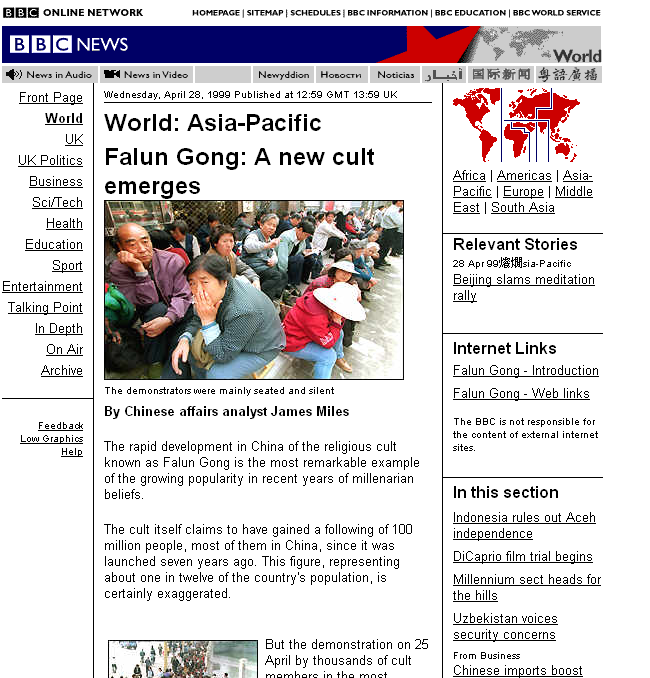The rapid development in China of the religious cult known as Falun Gong is the most remarkable example of the growing popularity in recent years of millenarian beliefs.
The cult itself claims to have gained a following of 100 million people, most of them in China, since it was launched seven years ago. This figure, representing about one in twelve of the country's population, is certainly exaggerated.
But the demonstration on 25 April by thousands of cult members in the most politically sensitive area of the capital clearly showed that it is highly organised and can mobilise supporters from a wide area. Some of the protesters were from the countryside and from other northern Chinese cities.
Cult members strongly object to the use of the words, "cult," "religion" or "millenarian" to describe their beliefs. But this may well be a defensive measure in a country where such terms alarm the government.
The only officially approved religions are Taoism, Buddhism, Christianity, Confucianism and Islam, and the government exercises strict control over these faiths. Any other religious activity is condemned as superstition.
One reason why Falun Gong has succeeded in growing so fast without provoking a major crackdown by the government may be that the movement appeared to be little more than a variation on the traditional Chinese meditation system known as Qi Gong.
Many urban Chinese, both officials and ordinary citizens, practice Qi Gong as a way of keeping mentally and physically fit.
When the founder of Falun Gong, Li Hongzhi, emerged to expound his beliefs in 1992, he presented himself as a leading Qi Gong expert.
'Superstition and false science'
But "Master Li" - as he is known to his followers - believed that people needed more than Qi Gong in its commonly practiced form to ensure their spiritual well-being.
In his book, Zhuan Falun, and in a series of lectures around the country and abroad, he described the importance of cultivating what he called one's "Inner Nature" by upholding the three principles of Truth, Benevolence and Forbearance.
By doing so, the practitioner could move to a higher level of what he saw as a multi-layered cosmos. He explained that Buddha and Jesus, as well as himself, were beings from higher levels who had come to help humankind from the destruction it could face as a result of rampant evil.
Master Li's book became the bible of the new sect. Practitioners read the work over and over again. In 1996, the government banned the work as superstition and false science. But copies produced in Hong Kong are widely circulated in China.
Leading intellectuals
The government may have resisted taking any further action against the cult because many of its followers are leading intellectuals, as well as some Communist Party members and officials. Falun Gong groups have mushroomed on university campuses as well as abroad among highly educated ethnic Chinese.
Some official newspapers have published articles attacking one of the central beliefs of followers, namely that true devotees are immune to illness and have no need to visit doctors.
But the demonstration in Beijing could well eventually result in a sterner response. The protest, albeit peaceful, quiet and orderly, must have been an embarrassment to the government given that it was held despite heightened security in the capital in advance of the 10th anniversary in June of the crushing of the 1989 Tiananmen Square protests.
(BBC, April 28, 1999)

Original text from: http:/ews.bbc.co.uk/2/hi/asia-pacific/330367.stm